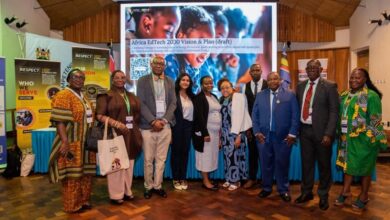
In a bold move to democratize artificial intelligence education in Africa, Qhala has kicked off Africa AI Week 2025 today, June 21. The initiative, running through June 28, will train 700 educators across multiple African countries under the powerful theme “AI in My Language, My Classroom, My Future”.
Comprehensive Training Program Spans Multiple Nations
The week-long program features training sessions across five strategic locations in Kenya – Nairobi, Nakuru, Kilifi, Kisumu, and Mt. Kenya – as well as dedicated sessions in Zambia, Senegal, and Togo, with additional online participation opportunities. All participating educators are registered with their respective national Teachers Service Commissions, ensuring implementation in formal education systems.
“To cultivate a strong talent pipeline, we must start early – by equipping young minds with the skills and curiosity to shape Africa’s AI-driven future,” said Barbara Osiro, Project Manager for Africa AI Week. “It’s not just about catching up; it’s about positioning the continent to lead in the global AI economy.”
Throughout the week, participating hubs will host Train-the-Trainer sessions accommodating over 200 educators per location, hackathons for children and tertiary-level learners, AI literacy workshops in both urban and rural settings, and EdTech showcases featuring real-world African AI solutions.
Addressing Africa’s Critical Digital Skills Gap
The initiative addresses a pressing continental challenge: the digital skills gap threatening to exclude African youth from the global AI economy. According to recent data, over 70% of Kenyan youth currently lack the digital competencies required in today’s technology-driven economy.
Dr. Shikoh Gitau, CEO of Qhala, emphasized the strategic importance of this approach: “We are not just talking about AI – we are training teachers, influencing policy, and designing curricula. If AI is the future of work, Africa must prepare from the classroom up”.
This initiative aligns with broader continental efforts, including the Africa AI Council launched earlier this year, which aims to drive AI adoption worth $2.9 trillion to Africa’s economy by 2030.
Strategic Partnerships Drive Implementation
Africa AI Week 2025 is backed by a diverse partnership ecosystem including Datocracy, Panoply, Aga Khan University, and media partner Mtoto News, alongside regional innovation hubs like BongoHive Zambia and Galsen AI Senegal. This collaborative approach mirrors successful models that have proven essential for scaling AI initiatives across the continent.
The initiative builds upon existing momentum, including Google’s $5.8 million investment in AI and cybersecurity education across Nigeria, Kenya, and South Africa, and the African Development Bank’s partnership with Intel to train 3 million Africans in AI skills.
Microsoft has also significantly contributed through its AI skilling initiatives in Kenya, targeting 1 million individuals, while companies like Sama have developed AI training platforms specifically designed to build diverse workforces.
A Focus on Curriculum Integration and Policy Influence
What distinguishes Africa AI Week 2025 from other initiatives is its explicit focus on curriculum integration and policy influence. The program draws inspiration from countries like China, which have successfully integrated AI into formal education systems, while maintaining a distinctly African approach emphasizing local languages and cultural contexts.
“These efforts position Africa not as a passive consumer of global technology trends, but as a shaper of responsible and inclusive AI applications – rooted in context, culture, and continent-wide collaboration,” declared Dr. Gitau.
Long-Term Vision Beyond Training
The initiative’s post-launch agenda includes a July policy roundtable with curriculum developers, national ministries, and continental actors to map AI’s place in national education strategies. This represents a crucial step toward sustainable integration of AI education across participating countries.
The focus on training teachers who will serve as multipliers addresses skills development systematically by building capacity within existing education systems rather than creating parallel programs. This approach ensures sustainable impact as trained educators continue to influence successive student cohorts long after the initial training.
As Africa continues its journey toward digital transformation, initiatives like Africa AI Week 2025 provide the foundation for the continent to shape rather than merely consume global AI developments, positioning Africa’s youth to lead in the AI-driven global economy of tomorrow.






